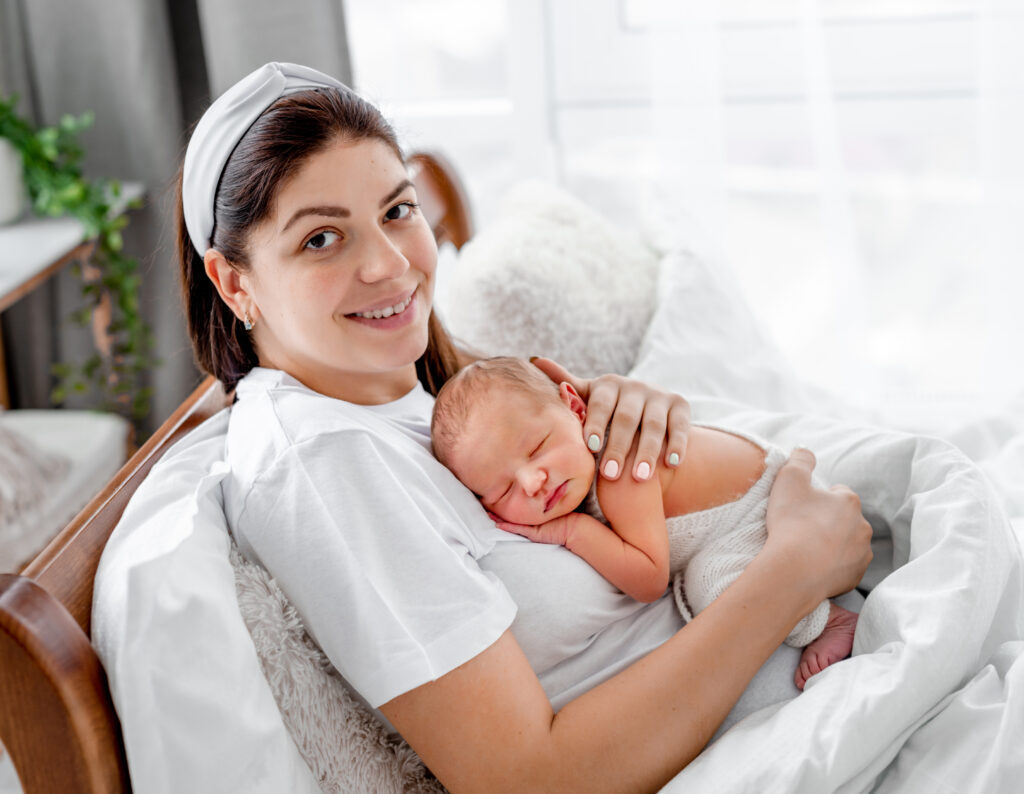
- +61 1300 704 750
- admin@parentinggenie.com.au
- PO Box 706, Townsville, QLD 4810

Bringing a baby into the world is life-changing, but the weeks after childbirth can be equally transformative for parents. While the focus often shifts to the newborn, the postpartum period is a critical time for recovery, adjustment, and emotional well-being. Every new mother and family deserves guidance and support during this stage, yet many are left unsure of what to expect. This guide shares survival tips for navigating postpartum care with confidence (care weeks after delivery). Postpartum Care Tips!
The postpartum period begins right after childbirth and typically lasts up to 6 weeks, though recovery can take much longer depending on individual circumstances. This is a time when the body is healing from labour and delivery, whether it is a vaginal birth or a cesarean section. Mothers may experience bleeding, soreness, hormonal shifts, and emotional highs and lows — all while adjusting to caring for a newborn.
It’s essential to recognise that postpartum recovery isn’t just physical. Emotional and mental well-being play an equally important role. Feeling tired, anxious, or overwhelmed is normal, but help is available to support you in coping.
Many parents underestimate the intensity of the postpartum period. Without proper care, mothers may face complications such as postpartum depression, infections, or delayed healing. Good postpartum care ensures recovery while strengthening the bond between parents and their newborn.
Proper postpartum care also enables parents to establish routines centred on rest, feeding, and self-care, thereby reducing the risk of burnout and exhaustion. Remember: taking care of yourself is not selfish — it’s necessary for both you and your baby.
1. Rest whenever possible
Sleep deprivation is inevitable with a newborn, but short naps and a consistent bedtime routine can help. Allow others to take shifts with the baby when possible so you can get restorative sleep.
2. Manage vaginal bleeding and healing
Postpartum bleeding, or lochia, can last for weeks. Using maternity pads and practising good hygiene helps reduce the risk of infection. If you notice excessive bleeding or large clots, contact your healthcare provider immediately.
3. Support your pelvic floor
Pregnancy and childbirth can weaken pelvic muscles. Gentle pelvic floor exercises (Kegels) strengthen muscles and aid recovery. If you experience incontinence or discomfort, consult your doctor or a physiotherapist.
4. Care for your perineum or incision site
If you had a vaginal birth (vaginal delivery), perineal pain is common. Ice packs, sitz baths, and pain relief recommended by your care provider can help. For C-section recovery, keep the incision clean and dry and avoid lifting heavy objects.
5. Nourish your body
Your body needs fuel to recover and produce breast milk if you choose to breastfeed. A balanced diet with protein, iron, calcium, and hydration supports healing.
Emotional Well-being and Mental Health
The postpartum period isn’t only about physical recovery — it also challenges emotional resilience.

Postpartum care isn’t just about the mother — it involves the whole family. Partners play a vital role by:
This shared responsibility strengthens family bonds and reduces pressure on the mother.
Healthcare providers play a crucial role in postpartum recovery. Schedule your postpartum visit — usually at six weeks, but earlier if concerns arise. This check-up ensures your body is healing well and allows you to discuss physical or emotional symptoms.
Additionally, lactation consultants, pelvic floor physiotherapists, and mental health professionals can all play vital roles in postpartum care. Don’t hesitate to reach out for support; you don’t have to navigate this period alone.
While discomfort is normal, some symptoms require immediate medical attention. Contact your health care provider if you experience:
Your health matters — never ignore warning signs.
At Parenting Genie, we know that postpartum care is more than just healing — it’s about feeling supported every step of the way. Our Parenting Community connects you with experts and fellow parents anytime, day or night. Whether you need guidance on recovery, baby sleep, or emotional well-being, you’ll find resources and reassurance at your fingertips.
The postpartum period is a time of change, recovery, and growth. With the right support, self-care, and professional guidance, parents can navigate this stage with strength and confidence. Remember, you are not alone. By prioritising your well-being, you’re also giving your newborn the best start in life.
The Raising Children website has some parenting tips and insights.